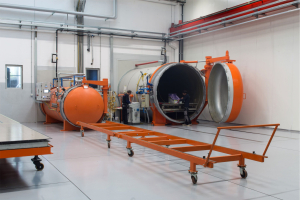Contributing to the development of a new aeronautical composite material
A leading aeronautical equipment manufacturer turned to the experts at Capacités to assist in completing the final stages in the development of their novel composite material.
Key words
Linked expertises
This aeronautics manufacturer required to integrate heat transfer in its numerical modelling of the injection of short-fibre thermoplastic composite parts in order to better apprehend the thermal effects occurring during the process.
Ascertaining the thermal properties of a material under representative conditions is the cornerstone in achieving any accurate thermal modelling. In this case, it meant taking into account the composite anisotropy and the effects of the thermoplastic polymer melting at high temperature.
Since no commercial device is capable of fulfilling these criteria, they entrusted this project to the experts at Capacités who came up with a strategy and a precise means of measurement.
Based on the manufacturer’s specifications, the specialists at Capacités designed a tailor-made experimental test bench able to monitor the evolution of the thermal conductivity of a composite in any direction in both solid and molten state. The development of this new device included a thorough evaluation of its performances from ambient temperature to 400°C with known reference materials.
Owing to the results that they received from Capacités, the manufacturer’s teams successfully refined their modelling of the injection process and were, ultimately, able to optimize the cooling phase of their process.
To complete this ambitious project, the Capacités’ experts benefited from support and technical equipment from the LTeN laboratory (Heat Transfer and Energy Laboratory), joint research unit of Université de Nantes and the CNRS.
Our projects
These projects may also interest you

A leading aeronautical equipment manufacturer turned to the experts at Capacités to assist in completing the final stages in the development of their novel composite material.

Composite materials’ behavior must comply with set standards for use in the aerospace industry, as defined by The National Centre for Space Studies (CNES, Centre National d’Etudes Spatiales). The verification process includes advanced mechanical tests that require specialized expertise in the mechanical behavior of materials. A leading player in the aerospace industry chose to collaborate with Capacités’ engineers to conduct measurements for u…

As part of its R&D activities, Liebherr Aerospace sought to measure, up to 400°C, the thermal conductivity of a thermal barrier coating, deposited in a thin layer on an aluminium substrate.

After having acquired new autoclaves, a certain automobile manufacturer requested Capacités’s services with a view to diagnosing and optimising the production process of its elastomer parts.
This site uses cookies and gives you control over what you want to enable